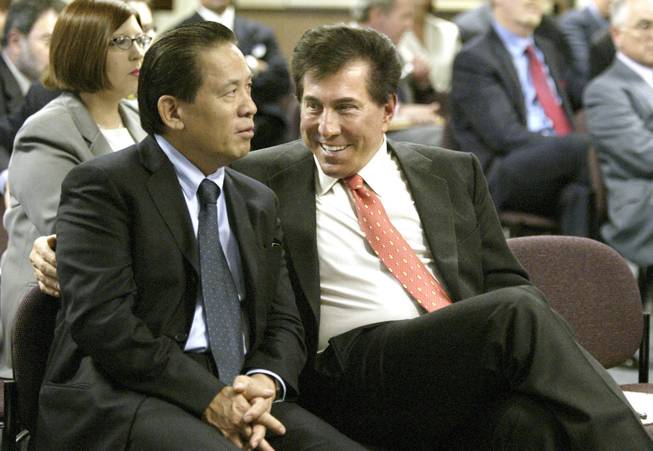
AP Photo/Nevada Appeal, Cathleen Allison
Las Vegas casino mogul Steve Wynn, right, talks with Kazuo Okada during a Gaming Commission hearing Thursday, June 17, 2004, in Carson City, where Okada received approval for a license for his Japanese Aruze Corporation to manufacture and sell slot machines in Nevada.
Tuesday, Sept. 4, 2012 | 2 a.m.
Sun archives
Wynn Resorts Ltd. board member Kazuo Okada asked a Las Vegas judge Friday to restore his status as Wynn’s largest shareholder.
The Japanese pachinko gambling device billionaire, in a filing with Clark County District Court Judge Elizabeth Gonzalez, also asked that he be allowed to nominate new directors for consideration at Wynn’s annual meeting Nov. 2.
Gonzalez set an Oct. 2 hearing on Okada’s request for a preliminary injunction against Wynn, which if granted would restore Okada’s share-voting rights.
The motion was made in one of the two lawsuits between Okada and Wynn Resorts that Gonzalez is presiding over.
The suits are part of an escalating struggle pitting Okada against Wynn Resorts Chairman and CEO Steve Wynn and board members allied with Steve Wynn.
Last week, Okada and one of his companies filed suit in Tokyo, claiming they were defamed by Wynn Resorts when the company moved to distance itself from Okada over allegations that Okada improperly provided benefits to Filipino gaming regulators.
Okada has denied wrongdoing and is challenging Wynn’s redemption in February of his nearly 20 percent, or $2.9 billion, stock stake.
Wynn Resorts exchanged Okada’s stock at a 30 percent discount for a 10-year, $1.936 billion note paying annual interest of 2 percent.
Although Wynn has said it moved against Okada in part because Okada’s actions threatened Wynn’s gaming licenses, Okada says this was a pretext and was ineffectual anyway because gaming regulators look at equity and debt holders the same way when making suitability determinations.
''Under Nevada law, if the Nevada Gaming Commission orders the disassociation of any 'unsuitable' person or entity from a licensed gaming enterprise, the unsuitable person or entity is precluded not only from holding stock but from holding the gaming company’s debt,'' Okada’s Friday filing said.
Okada claims the move to redeem his shares was aimed at solidifying Steve Wynn’s power while silencing Okada.
Okada claims Steve Wynn moved against him early this year because Okada in early 2011 had questioned Wynn Resorts’ pledge to donate $135 million to the University of Macau Development Foundation in China, where Wynn has a valuable gaming license.
Okada, in one of the lawsuits pending before Gonzalez, is pressing for the right to inspect Wynn books and records related to that donation as well as money he says Wynn Resorts may have spent entertaining and providing benefits to Macau officials while seeking its casino license there in the early 2000s.
Attorneys for Wynn Resorts have denied the firm provided benefits to any regulators and government officials, saying it’s a ''practice abhorred and flatly banned by Wynn Resorts.''
The University of Macau donation is now the subject of what Wynn Resorts has called an informal inquiry by the Securities and Exchange Commission, which likely is looking into Wynn’s compliance with the Foreign Corrupt Practices Act, a U.S. law aimed at deterring bribes to foreign officials and that also covers charitable gifts aimed at influencing regulatory decisions.
Wynn Resorts has said the Macau donation pledge for support of the new Asia-Pacific Academy of Economics and Management was made in compliance with all applicable laws and ''was consistent with the company’s longstanding practice of providing philanthropic support for deserving institutions in the markets in which it operates.''
If there were any violations of the act, Wynn has argued, they were violations by Okada in providing benefits to Filipino regulators while he worked to develop a gambling resort in the Philippines.
Wynn Resorts’ decision not to work with Okada on his Philippines resort appears to be a key factor behind the dispute between him and the company. Wynn says Okada is conflicted with that development because it would compete with Wynn’s big hotel-casino operations in Macau.
Okada, represented by attorneys at three law firms in Las Vegas, Los Angeles and New York, said in Friday’s court filing that it’s critical that through his company, Aruze USA, he be restored as a Wynn shareholder.
His attorneys say that’s because the Wynn Board’s move to redeem his shares may prevent him from voting his nearly 20 percent ownership interest ''and from presenting proposals for consideration at the company’s 2012 annual meeting of stockholders — including proposals for the nomination of independent directors to help break Mr. Wynn’s stranglehold on the company.''
Wynn Resorts has said it wants to remove Okada from its board, but it’s unclear whether it will attempt to do so at the annual meeting.
Okada’s filing says he wants to nominate up to four people to the board, but he didn’t identify them except to say they have no connection to Steve Wynn.
Wynn attorneys haven’t responded to Friday’s filing. They’ll likely continue arguing that Okada breached his duties as a director when his actions — in their view — put the Wynn gaming licenses in jeopardy.

Join the Discussion:
Check this out for a full explanation of our conversion to the LiveFyre commenting system and instructions on how to sign up for an account.
Full comments policy